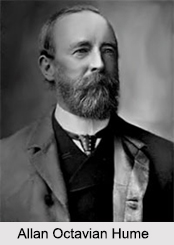 Allan Octavian Hume, popularly known as A. O. Hume, was a well known political reformer and a civil servant during the rule of British Empire in India. He was also an amateur horticulturalist and ornithologist. Hume was amongst the prominent founders of the Indian National Congress Party, which was a national political party that was later moderated by Mahatma Gandhi to lead the Indian freedom struggle. Allan Octavian Hume was also addressed as the "Father of Indian Ornithology", as well as the "Pope of Indian Ornithology", by those who found him dogmatic.
Allan Octavian Hume, popularly known as A. O. Hume, was a well known political reformer and a civil servant during the rule of British Empire in India. He was also an amateur horticulturalist and ornithologist. Hume was amongst the prominent founders of the Indian National Congress Party, which was a national political party that was later moderated by Mahatma Gandhi to lead the Indian freedom struggle. Allan Octavian Hume was also addressed as the "Father of Indian Ornithology", as well as the "Pope of Indian Ornithology", by those who found him dogmatic.
Early Life of Allan Octavian Hume
Allan Octavian Hume was born on 6th June 1829 at St Mary Cray, Kent County in South East England to father Joseph Hume. He received education at East India Company College in Haileybury and later he studied medicine and surgery at University College Hospital.
Political Career of Allan Octavian Hume
In the year 1849, Allan Octavian Hume came to India and he joined the Bengal Civil Service at Etawah in the North Western Provinces (now Uttar Pradesh) in the next year. In India, he served as a District Officer from the year 1849 to 1867. Later, he was appointed as the Head of a Central Department in the year 1867 and served the position until 1870. Hume also acted as the Secretary to the British Government of India from the year 1870 to 1879.
During the Great revolt of 1857, also known as Sepoy Mutiny of 1857, Allan Octavian Hume was involved in various military actions; and as a result of his participation, Hume was created a Companion of the Bath in the year 1860. During the Indian rebellion, he took refuge in Agra fort for around 6 months. He resumed his position in Etawah in January 1858. He was appointed as the Commissioner of Customs for the North West Province in 1867. Later A. O. Hume became attached to the Central Government as Director General of Agriculture in 1870. He was critical of the land revenue policy and suggested that it was the cause of poverty in India. His superiors were irritated and attempted to restrict his powers which led him to publish a book on "Agricultural Reform in India" in 1879. In the year 1879, he regressed to provincial Government at Allahabad.
Allan Octavian Hume openly criticized the management and administration of Lord Lytton. As a result his superiors were annoyed and tried to limit his authority. The Government of Lord Lytton discharged him from his designation in the Secretariat. In 1882, A. O. Hume retired from the Civil Service. Later in 1883, he wrote an open letter to the alumni and students of the University of Calcutta, requesting them to establish their own national political movement. This led to the first session of the Indian National Congress Party that was conducted in 1885 in Bombay (now Mumbai).
Contributions of Allan Octavian Hume
Allan Octavian Hume formed up an insurgent force of 650 loyal Indian troops and took part in several actions with them. He blamed the ineptness of the British administration for the revolt and followed a policy of mercy and forbearance. During his former service as a District Officer in the Indian Civil Service, Allan Octavian Hume started introducing free primary education and established "Lokmitra", meaning The People"s Friend, which was a local vernacular newspaper.
Allan Octavian Hume worked for the cause of education and established scholarships for higher education. In the year 1863, he moved for different schools for juvenile offenders instead of imprisonment. A juvenile reformatory was founded near Etawah due to his efforts. Hume also founded free schools in Etawah and also established 181 schools with 5186 students by the year 1857.
Later Life of Allan Octavian Hume
Allan Octavian Hume left British India in the year 1894 and resided in Upper Norwood in London. He died on 31 July 1912 at the age of 83. After his death, he received many tributes in India. The Indian Postal Department released a commemorative stamp in 1973.






